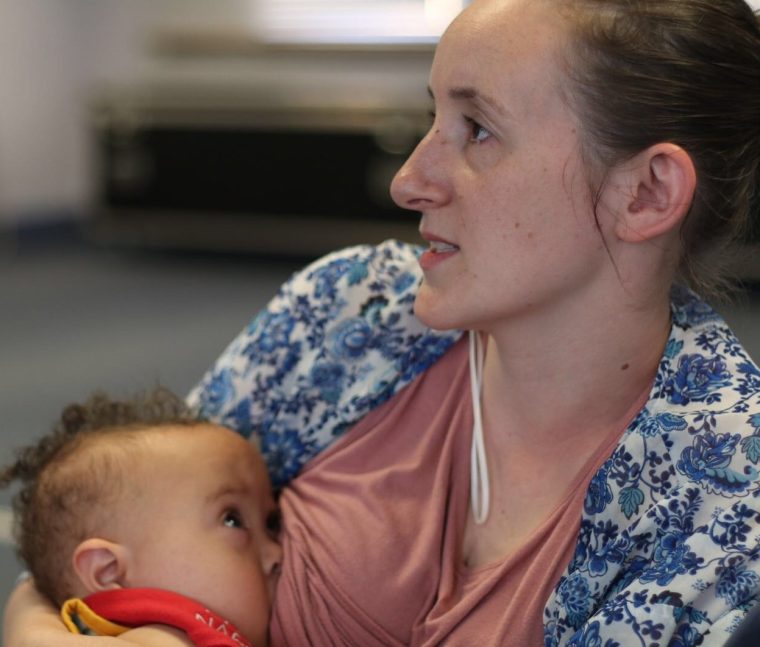A mother’s story:
I knew I wanted to breastfeed my baby. I knew it was natural. So I was surprised when baby James and I could not seem to get the hang of it. I phoned a Breastfeeding Supporter. She gave us some good ideas about how I was sitting and holding James. But most of all it was good to have someone to talk to.”
There are many reasons to breastfeed, but the simplest and most obvious one is “because you want to!” Your breasts have evolved to produce food for your baby, and if you want to use them for that purpose, you don’t need any other explanation. However, breastmilk is amazing, and some of the other great reasons for breastfeeding are described below.

Breastfeeding supports bonding, parenting and your baby’s development
Breastfeeding releases lots of a hormone called oxytocin (sometimes nicknamed “the love hormone”) in your baby and you. This helps you to form a loving bond, feel calm, relaxed and happy. It also helps your baby’s brain to grow and develop, which happens at an incredible pace in the first months of life. It is impossible to overfeed a breastfed baby, so breastfeeding can be used to sooth your baby, help them sleep, spend time together or rest whenever you want. Breastfeeding is a two-way relationship that supports both you and your baby emotionally.
You can learn more about this on these pages:
UNICEF leaflet: Building a happy baby, a guide for parents
UNICEF video: Breastfeeding and relationships in the early days
Parent-Infant Foundation: The first 1001 days
Health
Department of Health guidance states breastfeeding is the healthiest way to feed your baby. Exclusive breastfeeding (giving your baby breast milk only) is recommended for around the first six months (26 weeks) of your baby’s life. After that, giving your baby breast milk alongside other food will help them continue to grow and develop. The World Health Organisation (WHO) and UNICEF recommend breastfeeding alongside other foods to age two and beyond.
Breastmilk contains all the nutrients your baby needs for the first six months. It is much more than just food: it is also a living fluid, full of antibodies and other bioactive factors that strengthen your baby’s developing immune system, providing protection against infection, and other factors which help them digest nutrients. These living components are not found in infant formula.
You can read more about the many different components of breastmilk on this NHS page and also visit the Human Milk website for lots more information.
Not breastfeeding increases various health risks for both you and your baby.
Babies who are not breastfed have an increased risk of:
- infections, with more visits to hospital as a result
- diarrhoea and vomiting, with more visits to hospital as a result
- sudden infant death syndrome (SIDS)
- obesity
- cardiovascular disease in adulthood
Mothers who do not breastfeed have an increased risk of:
You can read more about how breastfeeding is linked to health on the NHS website.
Cost
You don’t have to pay for breastmilk and breastfeeding does not usually need any special equipment. The cost of exclusively feeding infant formula for six months and continuing to provide it alongside other food until 12 months ranges from approximately £33 a month for the cheapest available powdered infant formula to around £80 a month for one of the most widely available brands (First Steps Nutrition, data from November 2024. Note: all first infant formula sold in the UK is nutritionally equivalent. There is no need to purchase a more expensive brand). In addition, formula feeding requires bottles and teats which must be sterilised in between each use, and powdered infant formula must be mixed with boiled water that is at least 70 degrees C. Infant formula can also be purchased in pre-mixed cartons, which are more convenient, but these are much more expensive than powdered infant formula.
You may choose to use a breast pump and bottles to feed expressed milk, to wear special breastfeeding clothes or to buy breastfeeding pillows or other accessories. These things can be helpful, but it is usually possible to breastfeed without them.
Convenience
Breastfeeding may feel challenging at first, and can be more time consuming than bottle feeding, especially in the early days, but as your baby grows, your milk supply becomes established and you both become more practiced at feeding, you may find it becomes easier than bottle feeding.
To begin with, you may feel like you can only breastfeed in a certain way or particular place, but once you get the hang of it, you may find you can breastfeed almost anywhere, and whilst doing other activities.
Breastmilk is always available immediately, at the correct temperature, with no preparation required, at any time of day or night, so you can respond to your baby’s needs right away. It doesn’t need to be mixed, heated or cooled, it doesn’t go off in the breast and it won’t be wasted if your baby decides they only want a small feed. At night-time, you can breastfeed without getting out of bed!
Of course, breastfeeding means that you will be the only one who is able to breastfeed your baby, and this can sometimes feel overwhelming. However, even if you bottle-feed, UNICEF says that babies feel more secure if feeds are only given by their main caregivers, which helps them to bond. Once breastfeeding is established, you may decide to introduce an occasional bottle, which can be expressed breastmilk, giving you flexibility to be away from your baby for short periods of time. See our page on introducing a bottle for more information.

Environment
Breastmilk is the ultimate sustainable food. Breastfeeding has a very small carbon footprint compared to formula feeding. Infant formula is made from cows milk which must be processed, packaged, transported, stored and fed using bottles. By comparison, breastfeeding generates very little waste. You can read more about this here.
Culture
Breastfeeding is more common in some cultures and communities than others. You may want to breastfeed because it is the norm in your community or cultural setting. By contrast, you may be worried about breastfeeding, or may find breastfeeding challenging, because it is not so common within your community. However, there are breastfeeding support groups in most places in the UK which let you socialise in a place where breastfeeding is normal. These groups can give you practical and emotional support to help you continue breastfeeding. Check out our local groups here or contact the National Breastfeeding Helpline to find a group local to you.
Speak to a registered Breastfeeding Supporter
The National Breastfeeding Helpline is available
24 hours a day, 365 days a year. Or talk to us by webchat when available.

